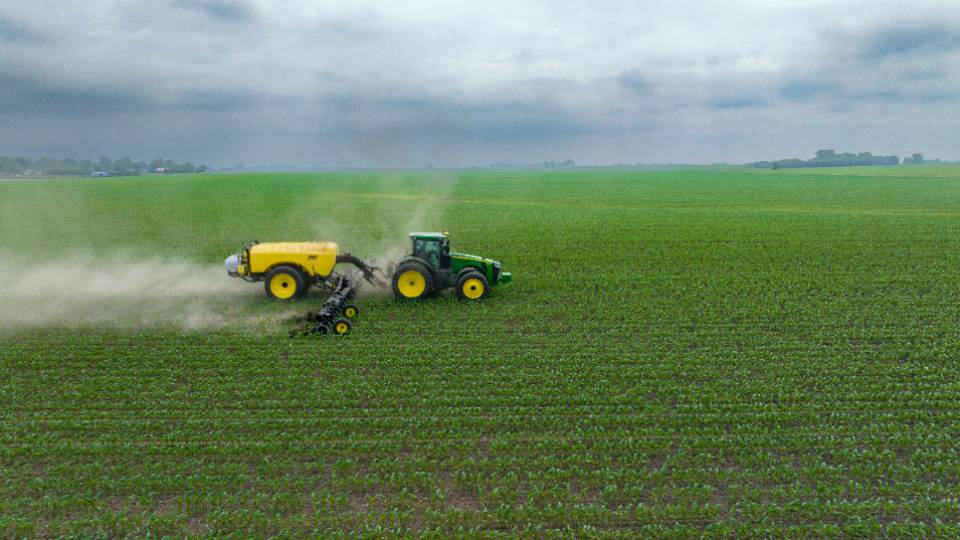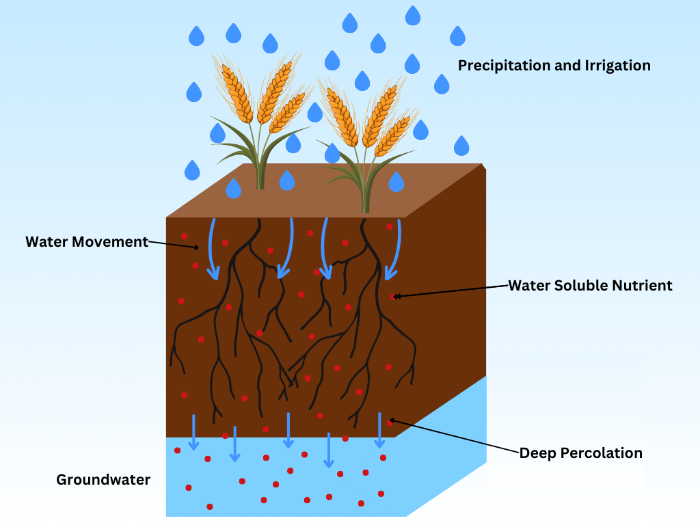Nutrient Application for Water Quality

Each agricultural goods producer has different needs when it comes to soil quality. The use of fertilizer can improve soil nutrients, positively influencing crop yields. However, if used excessively, fertilizer can negatively impact water quality by overloading water systems with nutrients- a state called eutrophication- causing algal blooms and high nitrate levels.
Nutrient Management Plan
One of the best ways to protect water quality when using fertilizers is by having a nutrient management plan. These plans prevent the overuse of fertilizers and put a plan in place to protect surface waters on a property. A well-considered nutrient management plan will include an evaluation of site factors that could be a cause for environmental concern, yearly soil testing, a calculation of nutrient application amounts based on crop yields and the current soil nutrients, and appropriate application methods [].
Site factors that could be a cause for concern include proximity to a well or surface water, and property proximity to protected drinking water areas [].
Application Tips
The quality of soil varies greatly from place to place, so there is no one-size-fits-all answer to “how much fertilizer is too much?” To ensure you are applying the correct amount of nutrients to your plants, test your soil yearly []. The type of crop grown, irrigation water, and organic matter can all alter the amounts of nitrogen and phosphorous in the soil [].
The best type of fertilizer to use is the type that maximizes crop yields while minimizing leaching. Leaching of nutrients occurs when the amount of water applied to a crop exceeds the plant uptake []. Nitrate fertilizer use should be limited when the potential for leaching is moderate to high, while ammonium nitrogen fertilizers should only be used when the potential for leaching is very low []. Consider slow releasing nitrogen fertilizers if your soil requires nitrogen supplementing throughout the entire crop period[].

Fertilizer application should be timed to maximize the benefit of the nutrients to the plant and to prevent the leaching of nutrients through the soil. Studies have found that nitrogen fertilizer should be applied early in the crop cycle, generally in the spring, with small additional applications if needed []. To reduce leaching, apply fertilizer after watering and consider applying smaller amounts of water more frequently.
Fertilizer should never be applied to frozen ground, and should have limited application on slopes and other areas with high runoff []. Some surface applied fertilizers need to be mechanically incorporated into the soil to prevent runoff and leaching []. Others, such and urea and nitrate fertilizers percolate through soil well, making mechanical incorporation unnecessary, as long as the fertilizer is applied in close proximity to the plants [].
Summary
Promote water quality on your property by:- Creating and maintaining a nutrient management plan
- Testing your soil annually
- Minimizing fertilizer leaching by using slow releasing fertilizers and applying fertilizers early in the crop cycle
- Fertilizing after watering
- Eliminating application of fertilizer on frozen ground and sloped areas
References
[1] Chaturvedi, P. K. (Ed.). (2021). Advanced Research and Review in Agronomy (Vol. 1). Bright Sky Publications. https://www.researchgate.net/publication/363249763_Water_Management_for_Climate_Resilient_Agriculture[2] Mesner, N., & Massie, L. (2012). How to protect your water from fertilizer contamination. Utah State University Extension.
[3] Silva, J. A., Evensen, C. I., & Bowen, R. L. (2000). Managing fertilizer nutrients to protect the environment and human health. In Plant Nutrient Management in Hawaii’s Soils, Approaches for Tropical and Subtropical Agriculture. University of Hawaii at Manoa. https://scholarspace.manoa.hawaii.edu/server/api/core/bitstreams/22b8d069-75f2-467c-b4e5-52d8646f4438/content
Authors
Erin Rivers, Water Quality Extension Specialist; Abby Barton, Intern
Related Research



